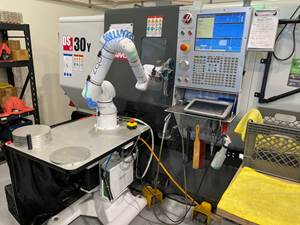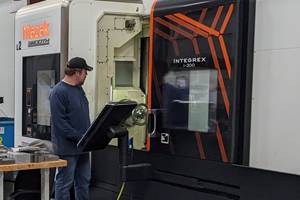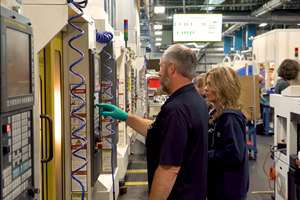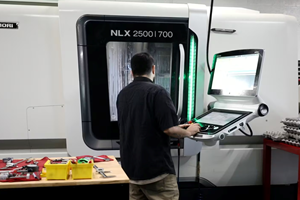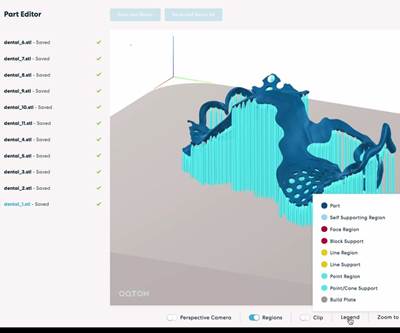ERP Helps Forward-Thinking Manufacturers Look Back
Enterprise-wide performance data and an understanding of which metrics matter form a foundation for the predictive analytics that characterize “smart” CNC machine shops.
Share





I recently used this space to report on a “factory operating system” that developers describe as “Google Maps for manufacturing.” Driven by artificial intelligence (AI), this computerized assistant predicts how different options for, say, sequencing manufacturing operations or scheduling jobs might play out. Based on both user priorities and historical data, the system suggests changes that are implemented automatically once approved.
This predictive analytic capability—this use of simulated “what-if” scenarios to guide decision-making and make manufacturing proactive rather than reactive—is the kind of thing that thought leaders envision when they describe the “smart” factories and shops of the future. However, it seems to me that many shops are not yet ready to take full advantage of predictive analytics, regardless of whether AI is involved.
Jeff Ralyea, president of the manufacturing division of software developer ECi, says the same thing about many of the company’s JobBoss and M1 enterprise resource planning (ERP) system users. “At first, a lot of companies just want to be able to get the information out of Steve’s spreadsheet when he goes on vacation,” he explains. With that accomplished, manufacturers tend to seek insight about their businesses by using ERP data to “look in the rear-view mirror,” he says. “They’re not doing predictive anything.”
Looking back is essential to looking forward...
However, manufacturers motivated to use the mirror provided by an ERP system are likely farther along the path toward predictive analytics than they realize, he says. Looking back is essential to looking forward, and ERP can provide a foundation for both. By extension, it can help manufacturers prepare for the inevitable, yet unpredictable change that developing technologies like AI and machine learning can bring.
For one, the primary function of ERP—streamlining day-to-day business management tasks—makes the software a unified, organized source of information about everything from quoting and material management to finances and logistics. Much of this data can directly feed predictive analytics systems. For instance, AI-driven scheduling can derive critical assumptions for modeling different scenarios directly from ERP data, including orders of operations, processing times at various workstations, the locations of potential bottlenecks and more. “The first step to using data is to effectively collect it in the first place,” Mr. Ralyea says.
For another, the latest ERP systems are more tailored than ever to individual users’ needs—users that increasingly crave capability to leverage their data. “Manufacturers are looking to us for insight,” he says. “Probably the most important things they’re looking for are pre-built dashboards that explain how efficient and effective they are, as opposed to just operational documents.”
Determining what these dashboards will look like begins with determining which questions need answering for the specific manufacturer in question. In ECi’s case, he says consultations with customers and prospects tend to be specific and granular, digging into how specific business units have performed in the past, why they perform the way they do and how their performance should be evaluated in the first place.
With a customized system in place, reflective analysis can morph into an elemental form of predictive analysis. For instance, top decision-makers can predict the result of adding a three-axis machining center instead of a five-axis, or going without new equipment. People in other roles can use different dashboards developed from different sets of questions to inform their own “what-if” exercises. “If you’re the operations manager,” Mr. Ralyea explains, “we can help answer questions like, How efficient are my workers and machines? How many jobs can I get through? What kind of disruption will occur if I drop a hot-parachute order into the factory?”
Shop smarts likely require more than ERP. For instance, functionality required for predictive maintenance, such as processing sensor feedback that indicates the health of a machine tool spindle, is generally outside the purview of shop-management software. Nonetheless, ERP data—how many jobs are scheduled in the next month, part-quality information and so forth—can be beneficial or even necessary to predicting when maintenance should occur and what might happen if it doesn’t.
Overall, machine shops should understand that ERP can do more than streamline functions like accounting, inventory management and various forms of reporting. These systems also can inform what additional data to collect, how to collect it and what to do with it in the future. “Whatever other tools and technologies are available won’t be applicable unless you know what really matters to you,” Mr. Ralyea says.
Related Content
Becoming a More Efficient Shop With the Right Processes and Software
After refining its machining processes for more efficient production, this shop still needed a better way to track its data. Here's how it found a software solution.
Read More5 Tips for Running a Profitable Aerospace Shop
Aerospace machining is a demanding and competitive sector of manufacturing, but this shop demonstrates five ways to find aerospace success.
Read MoreShop Quotes Smarter, Works Harder with Machine Monitoring
Temco first installed MT-LINKi to optimize quoting. Now, the software helps the shop optimize its machines — and machine purchases.
Read MoreERP Captures Process Know-How Before it Retires
As shops struggle to overcome the skills gap, ERP systems can improve the onboarding process and help document processes as skilled workers retire.
Read MoreRead Next
AI Makes Shop Networks Count
AI assistance in drawing insights from data could help CNC machine shops and additive manufacturing operations move beyond machine monitoring.
Read MoreRegistration Now Open for the Precision Machining Technology Show (PMTS) 2025
The precision machining industry’s premier event returns to Cleveland, OH, April 1-3.
Read MoreSetting Up the Building Blocks for a Digital Factory
Woodward Inc. spent over a year developing an API to connect machines to its digital factory. Caron Engineering’s MiConnect has cut most of this process while also granting the shop greater access to machine information.
Read More






















.jpg;maxWidth=300;quality=90)
